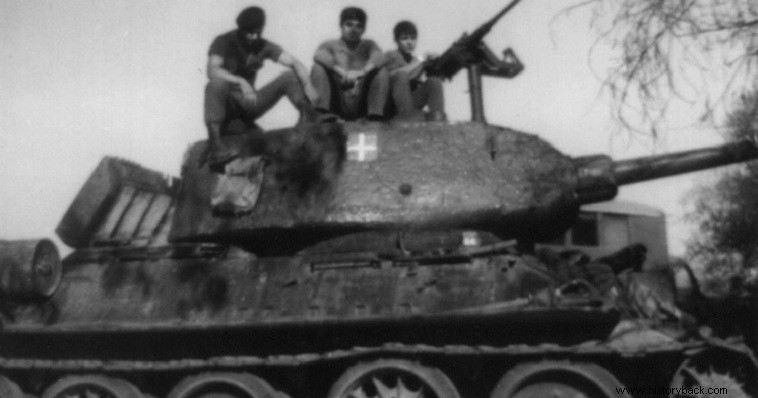
The National Guard was not in the best possible condition in 1974. Major responsibility for this situation lay with the government of Makarios, which did not contribute to the war preparations of Cypriot Hellenism. In the period 1964-1974, the Makarios government procured war material only from the Soviet Union, and very little at that.
In 1964, the only supply of material from abroad (USSR) took place, which was the purchase of 32 T-34/85 tanks, model 1943, completely incapable of dealing with the Turkish M-47 and later M-48 tanks.
With these tanks, a reduced-composition division was formed. 32 BTR-15V1 wheeled light armored vehicles were also purchased. Finally, only 20 Soviet M1944 100 mm guns were purchased. also of the Second World War, with which two squadrons with a reduced composition and six small P-4 class torpedo boats were formed. Modern, for the time, Soviet SA-2 anti-aircraft guided missiles were also ordered, but ultimately not received.
The specific choices of the Makarios government are at least strange, which with this specific procurement did not cover the elementary needs of the ΕΤ, both quantitatively and qualitatively. It seems, however, that this supply met the political needs of Makarios, who wanted to play the card of the USSR as well as the card of the Non-Aligned, with what this ultimately resulted in.
In this case politics once again undermined logic and irreparably undermined the military capabilities of the EF. This supply, without solving the island's defense problem, caused anger and fear across the Atlantic.
Makarios also never took measures to strengthen the EF, but rather the opposite. Loose laws his government passed prevented a significant number of conscripts from enlisting in the military, with dozens of exceptions he discovered – even engaged men could not enlist.
Thus the staff ceiling of the EF was continuously reduced. In 1970, instead of the planned 11,700 men, only 8,000 men served in the EF, while on the eve of the coup d'état he further reduced the duration of military service, with the result that when the Turkish invasion occurred the EF battalions had only 1/3 of the predicted of their strength.
This move by Makarios was made precisely to weaken the EF, which he considered a rival to his authority. Thus he continued to turn a deaf ear to the appeals of the respective head of the EF, a Greek general and therefore a potential opponent.
As the conflict with Athens escalated the climate for the Greek military on the island became openly hostile. Makarios constantly requested the reduction of the number of Helladic officers and non-commissioned officers who staffed the EF units.
Finally, in June 1968, there were only 25 Greek officers and 170 non-commissioned officers left in the EF units. The then commander of the EF, Lieutenant General Moronis, had repeatedly asked Makarios to change his attitude, stressing the non-combat value of the EF, but to no avail.
And the next leader of the EF, Lieutenant General Charalambopoulos and his successor Denisis, also tried to come to an agreement with Makarios, but again there was no result. The Cypriot government did not even take measures to limit insubordination and desertions.
A counterweight to the weakened EF was the Special Corps of his praetorians, whom he had equipped with modern assault rifles, but who had neither serious training, nor consequently had the corresponding morale to stand against regular forces.
The Turkish Cypriots, at the same time, had a trained reserve of 24,000 men, having implemented a four-year term. And here there is the oxymoron of Makarios, from the point of view of relying exclusively on Greece for the defense of Cyprus and on the other hand opposing the decisions of the national center, from 1963 onwards.
From the above it is clear the state of chaos that prevailed in the EF. When the barbarians finally came, the defenders' units in some cases did not even have the necessary number of men to serve the group weapons, while they also had serious shortages of officers.
Theoretically, the EF had a battalion of tanks, a reconnaissance battalion with Marmon-Herrington vehicles, granted by Greece, a nominal motorized infantry battalion, since the vehicles were not sufficient to transport all of its -theoretical- commanding force, three squadrons commandos, 15 infantry battalions, all at half and below their normal strength.
Also 20 Soviet 100 mm guns, eight American 75 mm mountain guns, given by Greece, about 50 British 25 pdr, also given by Greece, 36 6 pdr (57 mm) anti-tank guns also given by Greece and one squadron of anti-aircraft artillery.
The men's portable armament was also provided by Greece and was British and American - Enfield rifles, Bren machine guns and 0.30' and 0.50' in machine guns, 3.5' bazookas, 57 PAO , 75 and 106 mm. and 60, 81mm mortars. and 4.2 in.
In the air, Cyprus could only count on the intervention of the Greek Air Force, while at sea the same means were limited to the six old Soviet torpedo boats, which due to their age had extremely limited capabilities.
The Cypriot defense was therefore unprepared against a possible Turkish invasion, since even this old material it had could not be utilized to the fullest, due to shortages in materials and spare parts. For example the ancient EF T-34/85 tanks were purchased without radios and remained so until the end of their EF service.
But also the shortages in maintenance and spare parts make the sight of EV vehicles immobilized due to breakdowns a frequent sight. And when these vehicles were in combat conditions, things got much worse.
